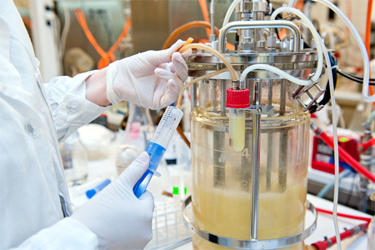Biopharmaceutical Fermentation Systems' Growing Role In Modern Medicine
By Pooja Sharma, Global Market Insights

Biopharmaceutical fermentation systems are vital to the production of biological drugs, including therapeutic proteins, enzymes, monoclonal antibodies, and vaccines. These systems are designed to cultivate microorganisms or cells in controlled environments, fostering the synthesis of biopharmaceuticals through metabolic processes.
In 2023, the FDA approved 55 new drugs, with biologics making up 30% of these approvals, according to the NIH. This marks an increase from the previous five-year average, where biologics constituted about 28% of all new drugs.
With the increasing demand for biologics and the rising need for advanced therapeutics, the biopharmaceutical fermentation systems market has witnessed substantial growth.
Global Market Insights Inc. (GMI) forecasts that the biopharmaceutical fermentation systems market size will register a 6% CAGR from 2024 to 2032, driven by expanding applications in biologics production and the rise in contract research and manufacturing services. As biopharma trends evolve, so do the technological advancements in fermentation systems, which are set to revolutionize drug development and manufacturing.
Upstream Products Behind Fermentation System Demand Surge
In biopharmaceutical fermentation, upstream processes are critical, laying the foundation for successful drug production. Upstream products in this domain include bioreactors, culture media, growth factors, and sensors, all of which are essential to fostering microbial or cell growth in optimal conditions. Among these, bioreactors represent a cornerstone, facilitating large-scale cell cultures required for mass drug production.
For example, in October 2024, Univercells Technologies by Donaldson, a provider of bioprocessing solutions, introduced the scale-X nexo bioreactor, a compact fixed-bed bioreactor with a 0.5 m² growth surface. This bioreactor is optimized for efficient cell culture process development across various modalities and is engineered for seamless scalability. The scale-X nexo aims to accelerate process development timelines, ultimately helping researchers and biopharma companies reduce costs.
The rising demand for biologics such as mAbs, therapeutic proteins, and vaccines is propelling the biopharmaceutical industry's need for sophisticated upstream products. According to BioPlan Associates, the size of the global bioreactor market alone reached $1.34 billion in 2022, underlining the growing reliance on upstream technologies. In fact, single-use bioreactors are witnessing remarkable adoption due to their ability to reduce cross-contamination risks, improve scalability, and decrease operational costs. These systems are designed for flexibility, enabling manufacturers to produce multiple products within the same facility without time-consuming and costly cleaning procedures.
In the upstream processes, advancements in culture media formulations and sensor technologies have further enhanced the efficiency and productivity of fermentation systems. Custom-designed culture media, particularly serum-free and chemically defined formulations, ensure consistent performance, reducing batch-to-batch variability. Moreover, sensors and process monitoring tools provide real-time data on critical parameters like pH, temperature, and dissolved oxygen, which are crucial for maintaining optimal cell growth conditions.
Against this backdrop, in July 2024, Merck announced the launch of commercial production on its first GMP-compliant cell culture media manufacturing line in China. The approximately €6.6 million investment, located at its Life Science Center in Nantong within the Yangtze River Delta industrial hub, is set to meet rising local demand for high-quality custom CCM for biopharmaceuticals, vaccines, and innovative therapeutics.
By focusing on innovation in upstream products, industry stakeholders can achieve higher yields, lower operational costs, and improved product quality, all of which are vital in the competitive biopharmaceutical landscape.
Antibiotics Production Via Fermentation Systems
Fermentation systems are indispensable in the production of antibiotics, which remain among the most widely used classes of pharmaceuticals globally. Antibiotics are typically produced through the fermentation of microorganisms such as bacteria and fungi. In this process, specific strains of microorganisms are cultured in large-scale bioreactors, where they metabolize substrates to produce antibiotic compounds.
Penicillin, one of the first antibiotics to be mass-produced using fermentation technology, remains a classic example of this process. Today, more advanced antibiotics like cephalosporins and macrolides are also manufactured using fermentation-based techniques. In response to the burgeoning antibiotics demand, in November 2023, to coincide with World Antimicrobial Awareness Week from Nov. 18 to 24, UNCTAD released three advisory reports outlining strategies for pharmaceutical companies, governments, and procurement bodies to improve antibiotic access across East Africa. The reports provide recommendations to enhance the investment environment for local production of essential antibiotics in Ethiopia, Kenya, and Uganda.
However, the rise of antibiotic resistance has created an urgent need for the development of next-generation antibiotics. According to the Global Burden of Bacterial Antimicrobial Resistance in 2019 study published in The Lancet, antimicrobial resistance (AMR) is among the top 10 global public health threats, linked to 4.95 million deaths in 2019 — surpassing fatalities from HIV and malaria. If unaddressed, AMR could cost the global economy up to $100 trillion by 2050. The World Bank forecasts GDP losses of up to 3.8% globally by 2050, potentially pushing 28 million people into poverty. Healthcare costs could rise by an estimated $1 trillion annually by 2030, with high-income countries facing a potential 6% increase in yearly healthcare expenses.
Biopharmaceutical fermentation systems are playing a critical role in this endeavor, enabling the production of novel antibiotics through synthetic biology and metabolic engineering. These technologies allow for the genetic manipulation of microorganisms, leading to the development of new antibiotic compounds that are more effective against resistant strains. As the global demand for effective antimicrobial agents continues to rise, fermentation-based antibiotic production will remain a critical component of the biopharmaceutical industry.
Contract Research Organizations Pioneering Innovation
CROs play an increasingly important role in the biopharmaceutical fermentation systems market, offering expertise in drug development, clinical trials, and regulatory compliance. CROs are essential partners for biopharmaceutical companies that require specialized knowledge and infrastructure to navigate the complexities of fermentation-based drug production.
With the rapid growth of biologics and biosimilars, many biopharmaceutical companies are outsourcing their R&D and manufacturing processes to CROs. This allows them to focus on their core competencies while benefiting from the expertise and resources of CROs. The CRO sector in India, as outlined in a study by the Department of Pharmaceuticals under the Ministry of Chemicals & Fertilizers, Government of India (August 2023), is expanding at a CAGR of 10.75% and is projected to reach $2.5 billion by 2030. This growth is propelled by specialized R&D service providers that support pharmaceutical and biotechnology companies in comprehensive drug discovery and development efforts.
CROs specializing in fermentation systems offer services such as process development, scale-up optimization, and analytical testing, which are crucial for ensuring the efficient production of biopharmaceuticals. These organizations are equipped with state-of-the-art fermentation systems, including both upstream and downstream technologies, enabling them to provide comprehensive support throughout the drug development life cycle.
In addition to traditional R&D services, many CROs are expanding their offerings to include bioprocess optimization using advanced tools such as artificial intelligence (AI) and machine learning (ML). For instance, in July 2024, Fortrea introduced a new research and development division dedicated to advancing AI-driven clinical trial technologies aimed at enhancing study speed, safety, and efficiency. This innovation studio will collaborate with other Fortrea departments to offer clients tailored AI solutions, while also developing broader technologies to improve clinical trials overall, as per the announcement. These technologies allow for more precise control over fermentation processes, leading to higher yields and improved product quality.
North America: A Hub For Biopharmaceutical Fermentation Systems
North America, particularly the United States, remains a dominant player in the biopharmaceutical fermentation systems market. The region's strong biopharmaceutical industry, coupled with a well-established regulatory framework, has made it a hub for innovation and production. The European Federation of Pharmaceutical Industries and Associations reported that, in 2023, North America represented 53.3% of global pharmaceutical sales, while Europe accounted for 22.7%.
According to the Pharmaceutical Research and Manufacturers of America (PhRMA), the U.S. biopharmaceutical industry directly contributes 1.6% to the nation's GDP through its research, production, and operations. When including the economic impact on related sectors, the industry generates over $880 billion in value, supporting 3.4% of the U.S. GDP. This has spurred the adoption of cutting-edge fermentation systems across both research and manufacturing facilities.
The demand for biologics, including monoclonal antibodies, gene therapies, and vaccines, is driving the expansion of fermentation capacity in North America. The region is home to some of the world's largest biopharmaceutical companies, including Pfizer, Amgen, and Genentech, all of which rely on advanced fermentation systems for large-scale production. In addition, the FDA has been at the forefront of approving novel biologics, further fueling market growth.
In Canada, government support for biopharmaceutical research is also contributing to the region's market dominance. The Canadian government has invested heavily in the biopharma sector, with initiatives such as the Strategic Innovation Fund (SIF) providing grants and funding to companies developing innovative biologics and vaccines.
The GMI report forecasts that North America will account for over 40% of the global biopharmaceutical fermentation systems market by 2032, driven by strong demand for biologics and continued investment in research and development.
Conclusion
The biopharmaceutical fermentation systems market is poised for significant growth in the coming years, driven by advancements in biologics production, the rising demand for antibiotics, and the increasing role of contract research organizations. Upstream products, including bioreactors, culture media, and sensors, will remain essential to ensuring efficient and scalable fermentation processes.
As the industry continues to evolve, North America will maintain its leadership position, supported by robust R&D investments and a strong regulatory framework. The rise of next-generation biologics, such as gene therapies and personalized medicines, will further drive innovation in fermentation systems, creating new opportunities for industry stakeholders.
By focusing on technological advancements, strategic collaborations, and regulatory compliance, companies operating in the biopharmaceutical fermentation systems market will be well positioned to capitalize on the growing demand for biologics and other advanced therapeutics.
About The Author:
 Pooja Sharma is a writer at Global Market Insights who writes about technology, healthcare, and chemical sectors.
Pooja Sharma is a writer at Global Market Insights who writes about technology, healthcare, and chemical sectors.
